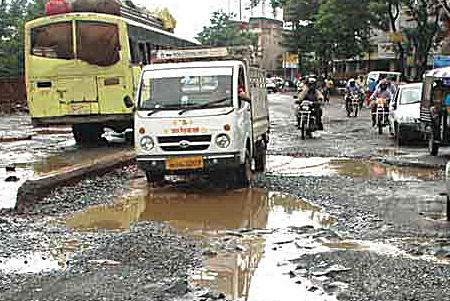Sir — The fact that Real Madrid’s Croatian midfielder, Luka Modric, won his maiden Ballon d’Or this year speaks volumes about his ability to fight against odds. He overcame stiff competition from the likes of Juventus’s Cristiano Ronaldo and Barcelona’s Lionel Messi who, between themselves, have won the award for 10 consecutive years. As a child, Modric battled adversities as a refugee in war-ravaged Croatia. No amount of accolades are enough to do justice to the achievements of this modern-day maestro who has taken the football fraternity by storm.
Ashima Saha,
Calcutta

Although it is usually the driver who is held responsible for fatalities in road accidents, one should not overlook the fact that poor condition of road infrastructure is a major cause for these mishaps. The Telegraph file picture
Roads to hell
Sir — The Supreme Court’s concern over the number of deaths caused in road accidents owing to the presence of potholes is justified (“SC glare on 15000 pothole deaths, ‘more than on border’”, Dec 7). The apex court has rightly termed such deaths “unacceptable”. Although it is usually the driver who is held responsible for fatalities in road accidents, one should not overlook the fact that poor condition of road infrastructure is a major cause for these mishaps.
During an inspection last year, the Delhi public works department found as many as 2,000 potholes and rough patches in the region. This is alarming. Besides potholes, broken tiles on footpaths, dislocated kerbstones and trees blocking key areas also affect traffic and contribute to the increasing number of road accidents in the country.
It is distressing that, according to a report of the International Road Federation, Geneva, India ranks first in the world in terms of deaths on the roads, with more than 1.46 lakh fatalities annually. The Centre and the state governments must overhaul the road infrastructure as soon as possible in order to tackle this problem.
Tushar Anand,
Patna
Sir — The apex court recently said that the number of deaths in road accidents caused by potholes in India is probably more than that of people killed on the border or by terrorists. Between 2013 and 2017, 14,926 such accidents were reported across the country. Moreover, many passengers whose vehicles are involved in such accidents suffer fractures and other severe injuries, at times, resulting in partial or complete physical impairment. The plight of travellers in the back seats of buses owing to the jerks and jolts caused by potholes should not be ignored either.
Apart from the personal loss that the families of the victims have to endure, deaths and injuries in accidents also put a strain on the country’s economy, since the government is liable to provide monetary compensation in such cases. It is not only the responsibility of the Centre but also that of the state governments to keep roads in proper condition, whether these are national and state highways or suburban roads.
K.V. Seetharamaiah,
Hassan, Karnataka
Sir — The striking observations of the Supreme Court regarding the deaths caused by potholes show that the authorities have shown little concern about the maintenance of roads over the years. This lapse must be addressed immediately.
Mohd. Umar,
Madhya Pradesh
Learn new tricks
Sir — Any form of entertainment which involves the use of animals and birds needs to stop completely, not just in India, but also around the globe (“Showstopper”, Dec 5). Such practices have no place in civilized society.
Once the government’s proposed ban is implemented, the creatures that are presently used in such shows must be rehabilitated following strict international norms. Some of them could find space in the existing zoological gardens. Others could be put up for adoption under the supervision of the government and non-governmental organizations. India must also develop more wildlife rehabilitation centres for animals that are currently being held captive illegally.
There remains the broader question of providing employment to people who will lose their livelihoods owing to this ban. Policy guidelines should be initiated, following a pilot survey, by the government and the industry stakeholders, like circus owners, to make sure that adequate financial compensation is provided to the workers. Indian circuses must adapt to the new millennium by focusing on human performances. Any change is challenging, but such steps are necessary and should be welcomed.
Saikat Kumar Basu,
Lethbridge, Canada
Sir — Indians profess concern for myriad creatures: from mythical animals found in sacred texts to beasts of burden. Yet the plight of wild animals eludes them. What else can explain the prevalence of animal performances in circuses?
Rohan Singh,
Calcutta











